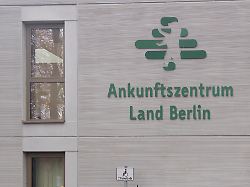No more place in city-states
Berlin senator calls refugee distribution outdated
7/31/2023 3:09 p.m
In Germany, the Königstein key regulates how many asylum seekers a federal state must accept. But the Berlin Senator for Integration considers this mechanism to be outdated. According to her, if there are no new regulations, there is a risk that tent accommodation will be set up in the second half of the year.
Berlin’s integration senator Cansel Kiziltepe is calling for changes to the German distribution mechanism in view of the increasing number of refugees. “We need a reform of the Königstein key, we need a special rule for city states like Berlin,” says the SPD politician in an interview.
As justification, Kiziltepe points out that densely populated city states such as Berlin naturally have limited space available for new refugee accommodation. The current key, which regulates the distribution of people among the countries based on their population, among other things, is no longer up to date. According to her own statements, the senator is already holding talks with the other two city states of Hamburg and Bremen.
In Germany, the Königstein key determines how many asylum seekers a federal state must accept. This is calculated on the basis of tax revenue and the population. According to the Federal Office for Migration and Refugees, Berlin accounts for 5.2 percent. In addition, there are still many Ukrainians fleeing the Russian war of aggression – many of whom are currently finding private accommodation. “Of course, these people are often drawn to Berlin because we have a high level of welcome here and are also pioneers nationwide with our integration services,” says Kiziltepe.
“emergency variant”
According to the State Office for Refugee Affairs (LAF), Berlin took in around 16,000 refugees in the first half of the year. There are 7,473 asylum seekers – an increase of more than 50 percent compared to the same period last year – and 8,502 war refugees from Ukraine who have a different residence status.
Based on forecasts, Kiziltepe assumes that another 10,000 to 12,000 refugees will come to Berlin by the end of the year and that tent-like halls could also be used as temporary accommodation for their accommodation. This is an “emergency variant that we see as a temporary solution”.
